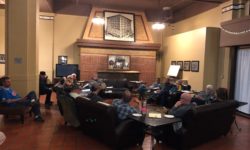2018-2019 Philosophy Symposium – “The Environment, Ethics & Stewardship” (Part 1)

Our 2018-2019 Philosophy Symposium Series “The Environment, Ethics & Stewardship” looked at numerous philosophical issues & perspectives related to ethics, the environment, and conservation stewardship, ranging from public vs. private land (including individual rights, collective rights, indigenous rights, other); landowner/steward-wildlife and habitat relationships, and; current & future environmental/conservation challenges. At this symposium, six panelists from a variety of disciplines and backgrounds focused on the first of these three areas of discussion and spoke for 7-10 minutes each. Then the forum was opened up to free-flowing audience-panelist Q & A. Access audio-video, photos & more here!







